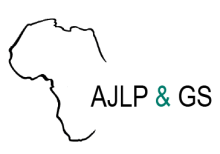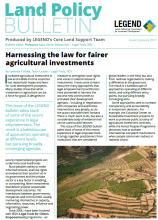Land Library
Welcome to the Land Portal Library. Explore our vast collection of open-access resources (over 74,000) including reports, journal articles, research papers, peer-reviewed publications, legal documents, videos and much more.
/ library resources
Showing items 1 through 9 of 116.Umoja (noun):/ooh-moh-jah/Umoja, is the Swahili philosophy of unity. Its principles underscore the significance of cooperation and communal solidarity.
This report is a contribution of the knowledge management component of the LAND-at-scale programme (LAS) which is funded by the Netherlands Ministry of Foreign Affairs, and implemented by the Netherlands Enterprise Agency (Rijksdienst voor Ondernemend Nederland - RVO).
This LEGEND bulletin takes stock of some of the recent experience in legal empowerment. The result is a kaleidoscope of approaches operating at different levels, but pursuing broadly converging agendas.
India registered rapid economic growth over the past couple of years, with the GDP growing 7.6 percent in 2015-2016. While economic activity remains buoyant, however, the country still has a long way to go.
Cornell International Law Journal: Vol. 50 : No.
This DPhil dissertation explores the logic, methods, and outcomes of a U.S. government- sponsored land reform in Lesotho, Southern Africa. The reform was part of a $363 million grant from the Millennium Challenge Corporation to the Kingdom of Lesotho that funded a sweeping change.
In this article, we reassess the role of marketing boards and similar arrangements that have played an important role in numerous agro‐food sectors of developed countries over almost a century.
The objective was to evaluate the performance of the co-management of Nishorgo Support Project at Chunati Wildlife Sanctuary in Bangladesh. I adopted the Focus Groups Discussion method for opinion survey and applied the SWOT-AHP technique for data analysis.
Co‐management (Co‐M), defined as the sharing of management tasks and responsibilities between governments and local users, is emerging as a powerful institutional arrangement to redress fisheries paradigm failures, yet long‐term assessments of its performance are lacking.






